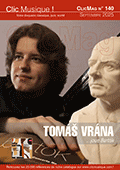 "Salut für Caudwell", du compositeur allemand Helmut Lachenmann (1935-), qui s’attache à « composer le son » (Klang Composition), poussant chaque fois un pas plus loin la réflexion sur le son et le bruit, apparaît comme une petite révolution sonore : texte (au message profondément politique) égrené de façon déshumanisée par le duo de guitaristes (ici Estelle Lallement et Filipe Marques), crissements, frottements et grincements extirpés aux instruments, la tension, dramatique, s’instille tout au long de la pièce – un monument de radicalité. Y succède "IV 14", courte partition de Mark Andre (1964-), compositeur français installé en Allemagne, dont la complexité d’exécution contraste avec sa fragilité à l’écoute. Enfin, Pascale Criton (1954-), compositrice, guitariste et clarinettiste, explore, avec "Trans", l’idée (mathématique) de la transitivité – où comment se déplacer au sein de micro-intervalles : la partition indique des scripts gestuels que les instrumentistes doivent suivre, souplement et dans la durée, sorte de matrice qui permet aux guitaristes de porter l’attention sur le façonnement du son dans le temps. Un disque exigeant et étonnant. (Bernard Vincken)  The new CD Haptic by the French guitar duo Lallement Marques, two musicians internationally recognized for its interpretations of the contemporary repertoire, presents a singular program through the compositions of three authors: Helmut Lachenmann, Mark Andre and Pascale Criton, a journey through the surprising sounds of music of our time. The publication opens with Salut für Caudwell by Helmut Lachenmann ((1935), a piece composed in 1977, with a performance by the Duo resulting from a long experience developed together with the composer. Characterized by a permanent tension, the score has become a reference work for the repertoire for two guitars, a piece by Lachenmann follows iv 14 by Mark Andre (1964), a piece of "intense fragility", terms in which, says Elisa Constable, "all the compositional challenges of Mark Andre's work, profoundly oriented towards the search for an ineffable artistic and spiritual." This intense journey of listening to the textures of different compositional languages ends with Trans, in five movements, by Pascale Criton (1954), an author who in his research he particularly explores the variability of sound and the spatialization of listening."
 |
